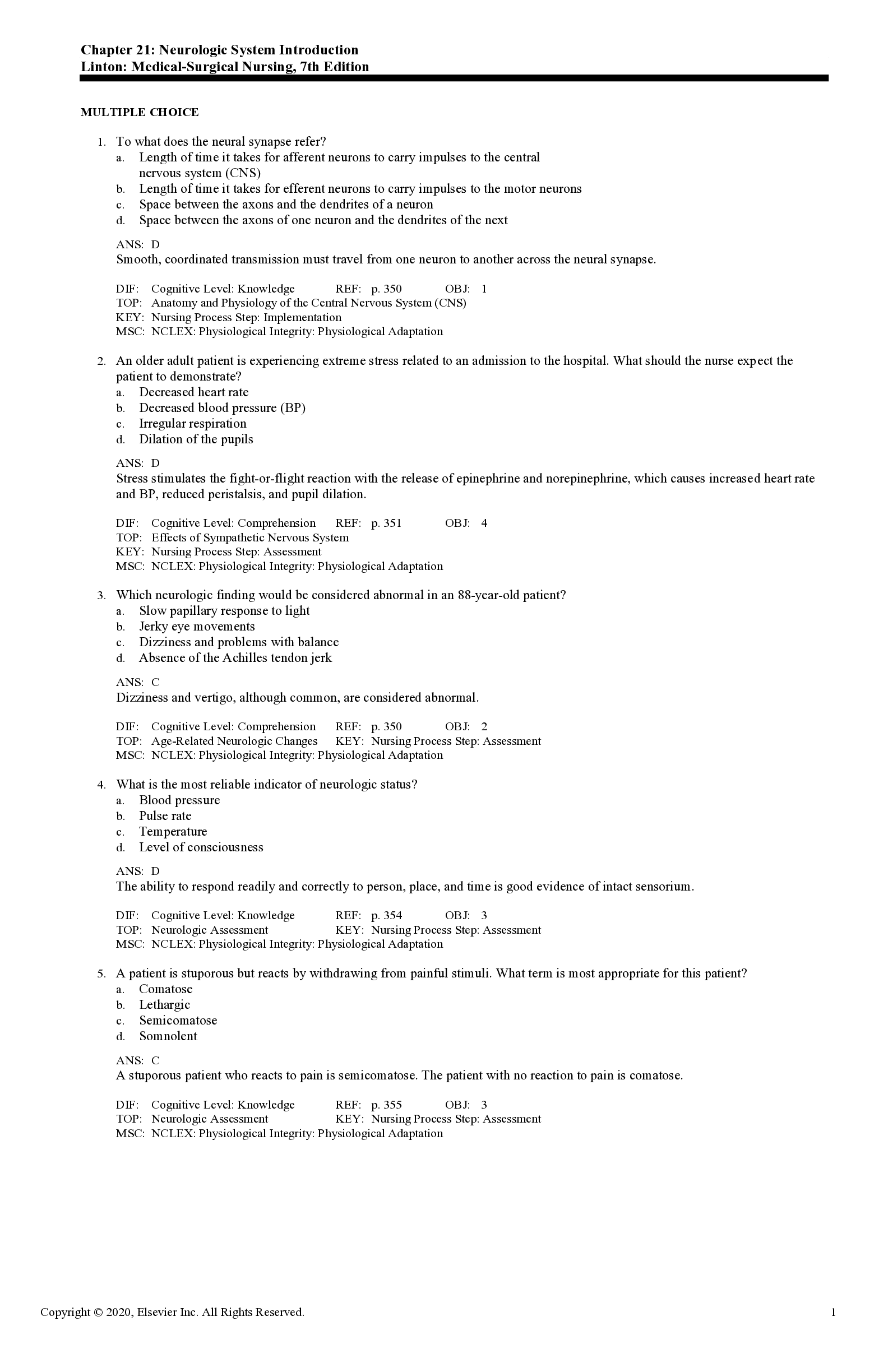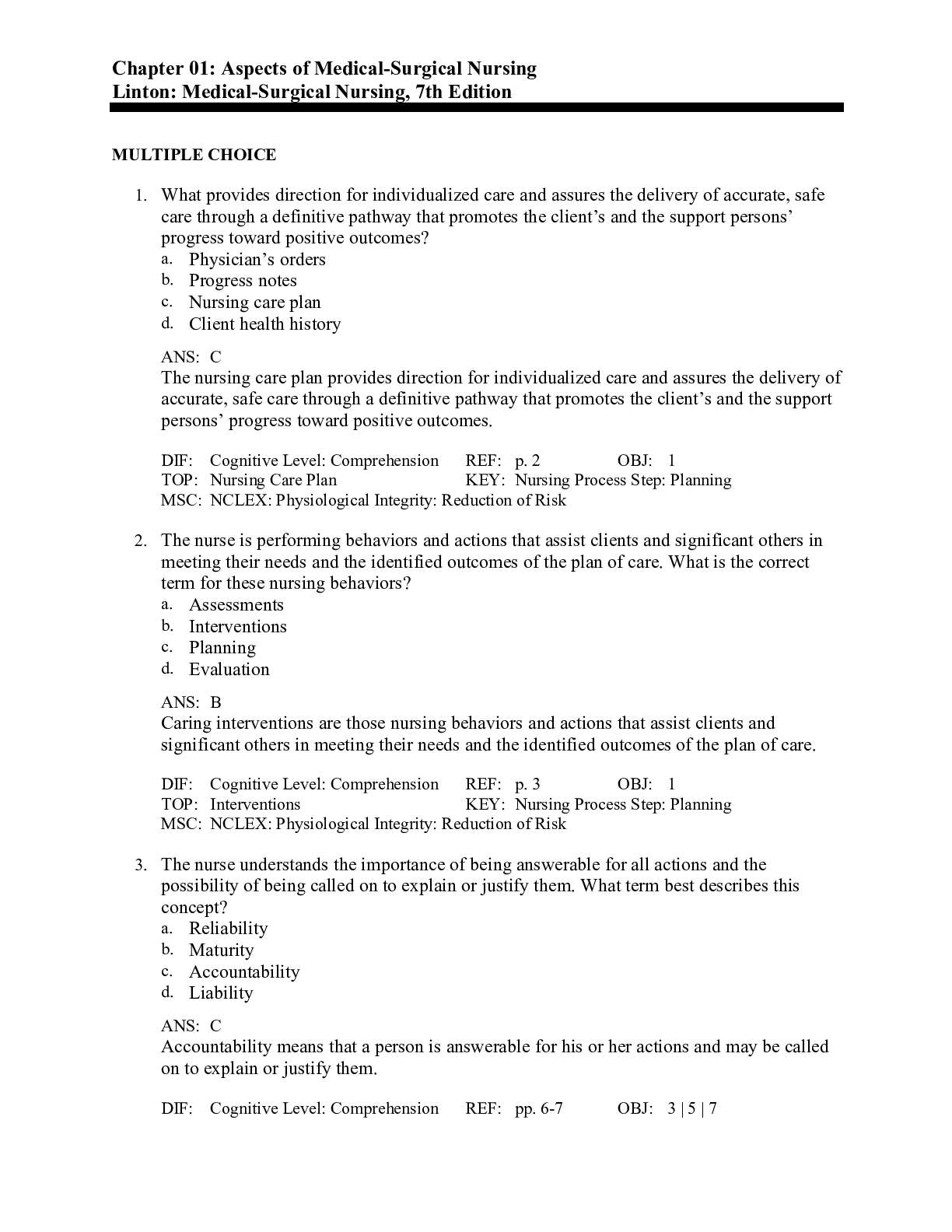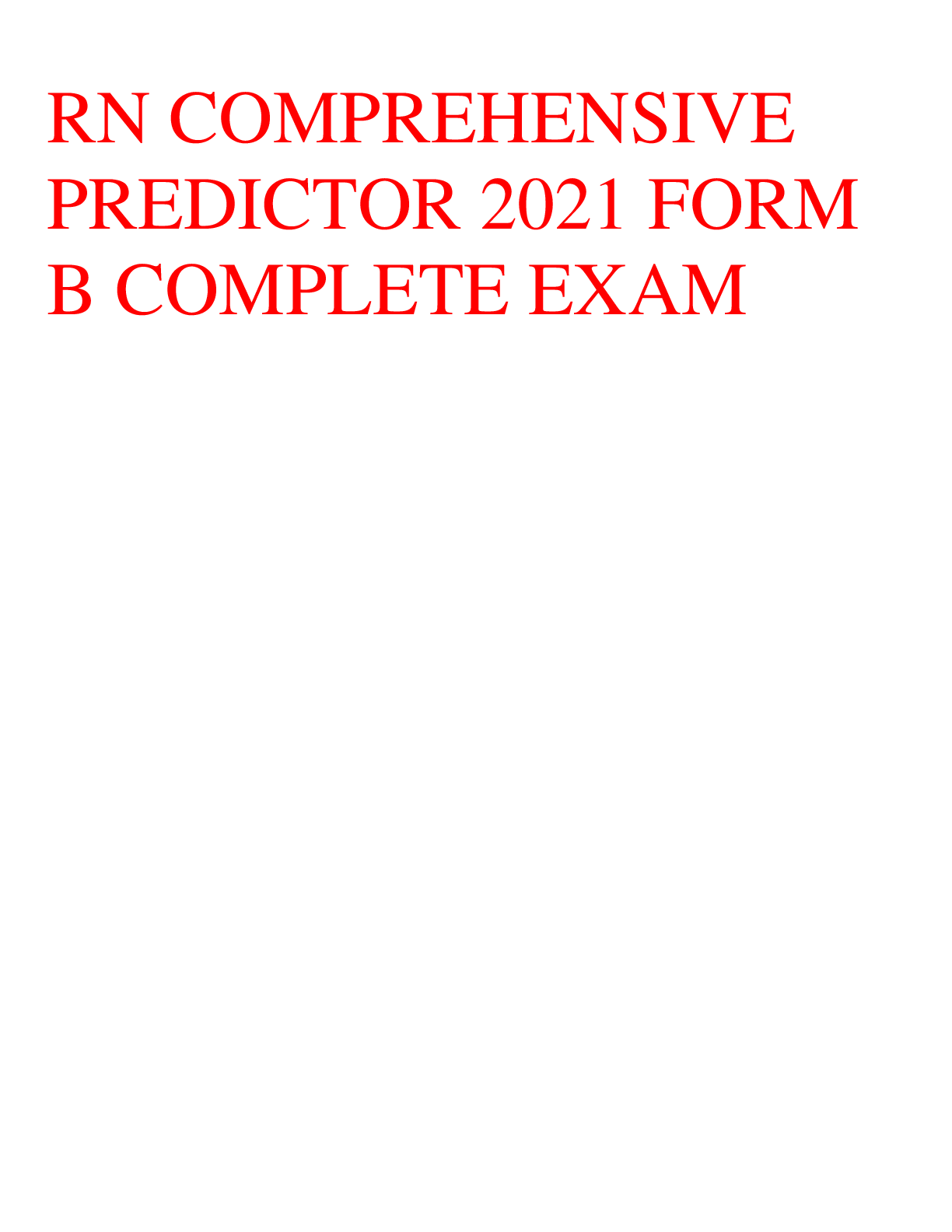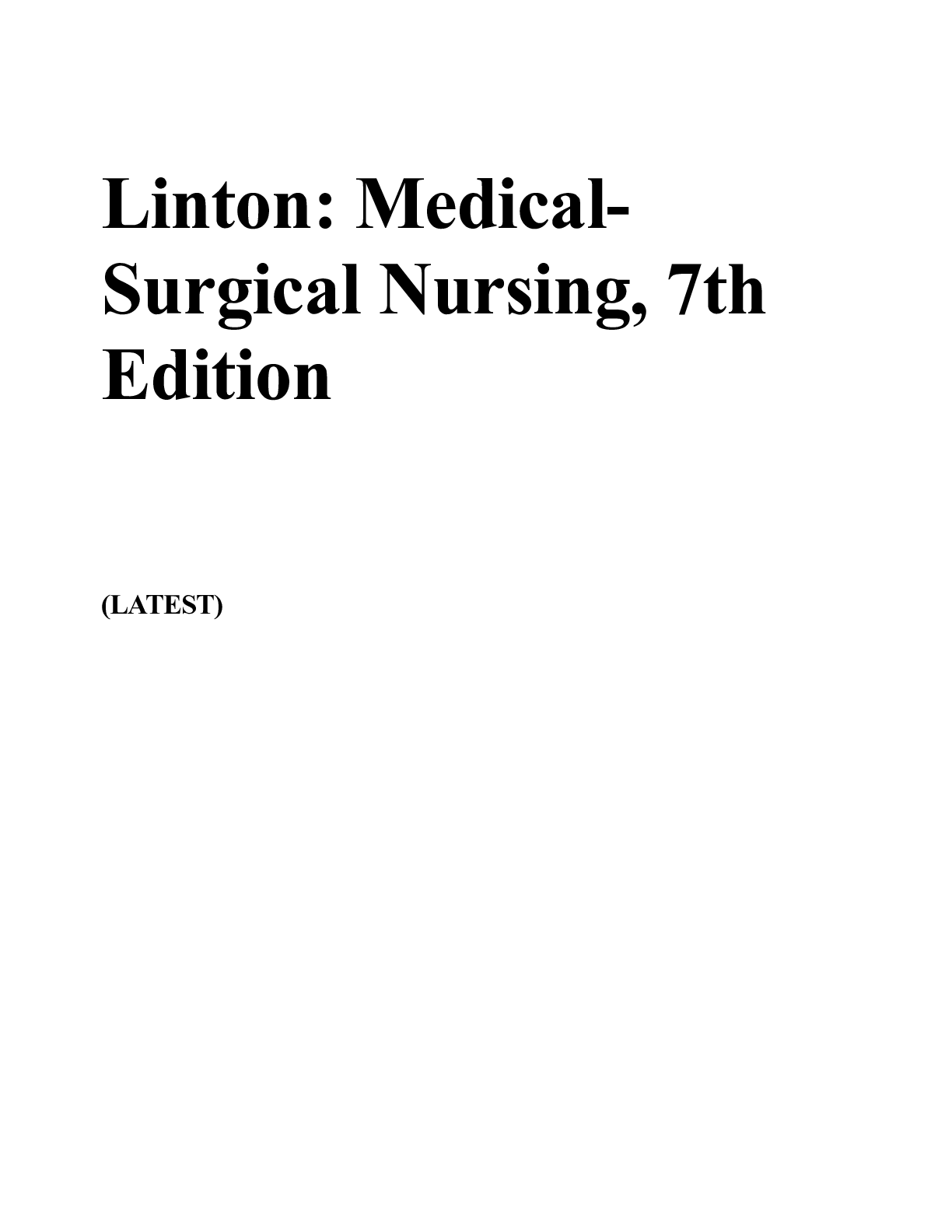Chapter 21 Linton: Medical-Surgical Nursing, 7th Edition
Document Content and Description Below
Chapter 21: Neurologic System Introduction Linton: Medical-Surgical Nursing, 7th Edition MULTIPLE CHOICE 1. To what does the neural synapse refer? a. Length of time it takes for afferent neurons to... carry impulses to the central nervous system (CNS) b. Length of time it takes for efferent neurons to carry impulses to the motor neurons c. Space between the axons and the dendrites of a neuron d. Space between the axons of one neuron and the dendrites of the next ANS: D Smooth, coordinated transmission must travel from one neuron to another across the neural synapse. DIF: Cognitive Level: Knowledge REF: p. 350 OBJ: 1 TOP: Anatomy and Physiology of the Central Nervous System (CNS) KEY: Nursing Process Step: Implementation MSC: NCLEX: Physiological Integrity: Physiological Adaptation 2. An older adult patient is experiencing extreme stress related to an admission to the hospital. What should the nurse expect the patient to demonstrate? a. Decreased heart rate b. Decreased blood pressure (BP) c. Irregular respiration d. Dilation of the pupils ANS: D Stress stimulates the fight-or-flight reaction with the release of epinephrine and norepinephrine, which causes increased heart rate and BP, reduced peristalsis, and pupil dilation. DIF: Cognitive Level: Comprehension REF: p. 351 OBJ: 4 TOP: Effects of Sympathetic Nervous System KEY: Nursing Process Step: Assessment MSC: NCLEX: Physiological Integrity: Physiological Adaptation 3. Which neurologic finding would be considered abnormal in an 88-year-old patient? a. Slow papillary response to light b. Jerky eye movements c. Dizziness and problems with balance d. Absence of the Achilles tendon jerk ANS: C Dizziness and vertigo, although common, are considered abnormal. DIF: Cognitive Level: Comprehension REF: p. 350 OBJ: 2 TOP: Age-Related Neurologic Changes KEY: Nursing Process Step: Assessment MSC: NCLEX: Physiological Integrity: Physiological Adaptation 4. What is the most reliable indicator of neurologic status? a. Blood pressure b. Pulse rate c. Temperature d. Level of consciousness ANS: D The ability to respond readily and correctly to person, place, and time is good evidence of intact sensorium. DIF: Cognitive Level: Knowledge REF: p. 354 OBJ: 3 TOP: Neurologic Assessment KEY: Nursing Process Step: Assessment MSC: NCLEX: Physiological Integrity: Physiological Adaptation 5. A patient is stuporous but reacts by withdrawing from painful stimuli. What term is most appropriate for this patient? a. Comatose b. Lethargic c. Semicomatose d. Somnolent ANS: C A stuporous patient who reacts to pain is semicomatose. The patient with no reaction to pain is comatose. DIF: Cognitive Level: Knowledge REF: p. 355 OBJ: 3 TOP: Neurologic Assessment KEY: Nursing Process Step: Assessment MSC: NCLEX: Physiological Integrity: Physiological Adaptation Copyright © 2020, Elsevier Inc. All Rights Reserved. 1. . Which describes the Babinski reflex? a. Downward curl of the toes b. Big toe bending upward c. Spreading out of the toes d. Pain in the big toe ANS: A Normal cortical function causes the toes to curl downward. Abnormal findings would be the toes turning up and spreading. DIF: Cognitive Level: Knowledge REF: p. 359 OBJ: 3 TOP: Neurologic Assessment KEY: Nursing Process Step: Assessment MSC: NCLEX: Physiological Integrity: Physiological Adaptation 7. What should the nurse assess when a patient is scheduled for an angiogram? a. Dizziness b. Allergy to shrimp c. Increased BP d. Irregular heartbeat ANS: B Allergy to shrimp and other shellfish also indicates a probable allergy to contrast medium. DIF: Cognitive Level: Application REF: p. 361 OBJ: 4 TOP: Angiogram Preassessment KEY: Nursing Process Step: Assessment MSC: NCLEX: Safe, Effective Care Environment: Safety and Infection Control 8. What diagnostic test might be contraindicated for a patient who has a pacemaker? a. Computed tomography (CT) b. Electromyography (EMG) c. Magnetic resonance imaging (MRI) d. Electroencephalography (EEG) ANS: C Metal appliances may be affected by the magnetic field during MRI. DIF: Cognitive Level: Knowledge REF: p. 362 OBJ: 4 TOP: Neurologic Assessment KEY: Nursing Process Step: Assessment MSC: NCLEX: Safe, Effective Care Environment: Coordinated Care 9. A patient with a severe head injury begins to assume a posture of flexed upper extremities, with plantarflexed lower extremities. What do these assessments indicate? a. Increasing intracranial pressure (ICP) with decorticate posturing b. Decreasing ICP with decerebrate posturing c. Decreasing ICP with decorticate posturing d. Increasing ICP with decerebrate posturing ANS: A Increasing pressure on the tissue above the midbrain results in abnormal flexion (decorticate posturing). DIF: Cognitive Level: Analysis REF: p. 366 OBJ: 4 TOP: Symptoms of Intracranial Pressure KEY: Nursing Process Step: Assessment MSC: NCLEX: Health Promotion and Maintenance: Prevention and Early Detection of Disease 10. What should be immediately reported by the nurse caring for a 90-year-old patient with a closed head injury? a. Blood pressure change from 147/72 to 176/70-mm Hg b. Respiration rate increase from 14 to 18 breaths/min c. Slow pupillary reaction bilaterally d. Temperature decrease from 100.2° F to 97.6° F ANS: A The widening pulse pressure is an indicator of increased ICP. Respirations and temperature are returning to more normal levels. Older adults have a slowed pupillary response as they age. DIF: Cognitive Level: Analysis REF: p. 366 OBJ: 3 TOP: Nursing Care of Patient with Closed Head Injury KEY: Nursing Process Step: Implementation MSC: NCLEX: Health Promotion and Maintenance: Prevention and Early Detection of Disease 11. Which assessment on a patient on mannitol therapy for cerebral edema indicates the medication is effective in decreasing ICP? a. Increased BP b. Increased urinary output c. Decreased pulse d. Widening pulse pressure ANS: B Mannitol is a hyperosmolar diuretic that draws fluid from brain tissue into the bloodstream, which is then excreted by the kidneys. Decreasing pulse and widening pulse pressure indicate increased ICP. DIF: Cognitive Level: Comprehension REF: p. 367 OBJ: 5 TOP: Mannitol Therapy in Increased Intracranial Pressure (ICP) KEY: Nursing Process Step: Assessment MSC: NCLEX: Health Promotion and Maintenance: Prevention and Early Detection of Disease Copyright © 2020, Elsevier Inc. All Rights Reserved. 2 [Show More]
Last updated: 11 months ago
Preview 1 out of 4 pages

Reviews( 0 )
Document information
Connected school, study & course
About the document
Uploaded On
Apr 28, 2023
Number of pages
4
Written in
Additional information
This document has been written for:
Uploaded
Apr 28, 2023
Downloads
0
Views
57




.png)

.png)


